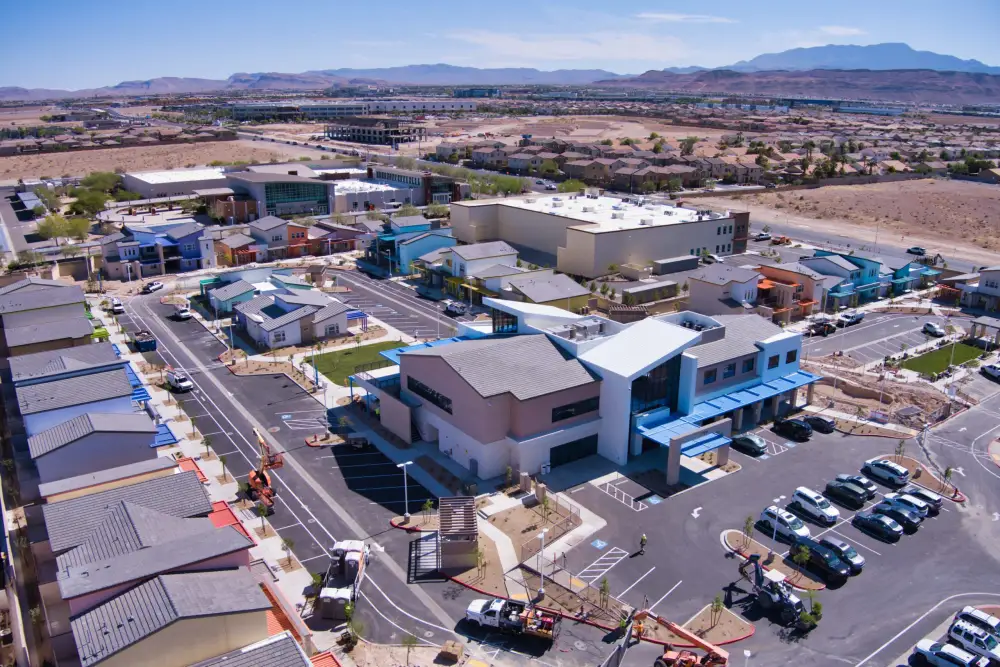Drones in Commercial Real Estate

Drones in Commercial Real Estate. Drones are revolutionizing the commercial real estate industry. They offer new ways to see, inspect, and market properties. These flying gadgets make things easier, faster, and more cost-effective for real estate professionals. Let’s examine how drones are utilized in this field and what it means for the future.
Key Takeaways
- Drones provide unique aerial views that highlight property features and surroundings.
- They enable property inspections to be conducted more quickly and safely, reducing the need for manual checks.
- Using drones can save time and money, making real estate processes more efficient.
- Drones help create engaging marketing materials, such as virtual tours and 3D maps.
- With advances in technology, drones are poised to play an even more significant role in the future of real estate.
The Evolution of Drone Technology in Commercial Real Estate
Drone technology in real estate is evolving rapidly. It offers high-quality visuals, immersive experiences, and cost-effective marketing solutions. Embrace drones for a competitive edge in property marketing.
Key Benefits of Using Drones in Commercial Real Estate
Enhanced Property Marketing
Using drone footage in property listings can significantly enhance their attractiveness. Drones can capture stunning aerial views that reveal the full potential of properties. This enhanced marketing potential can attract more buyers or tenants. With panoramic shots and immersive virtual tours, properties stand out in a crowded market.
Efficient Property Inspections
Drones streamline the inspection process by providing detailed views of hard-to-reach areas, allowing for more thorough inspections. This makes it easier to identify issues that require attention, enhance maintenance, and ensure regulatory compliance. Using drones enables faster, more detailed inspections, saving time and resources.
Cost and Time Savings
Drones are more affordable than crewed aircraft and helicopters and provide higher-quality imagery than satellite imagery. This affordability, combined with their efficiency, results in high cost and time savings. Professionals can conduct inspections and create marketing materials quickly and cost-effectively, giving them a competitive edge.
Drones have proven to be invaluable tools in the commercial real estate industry, offering benefits that were once difficult to obtain.
Applications of Drones in Property Management
Drones have become a game-changer in property management, offering a range of applications that enhance efficiency and safety.
Routine Maintenance and Inspections
Drones can easily access hard-to-reach areas, capturing high-resolution images or videos for maintenance checks and damage assessments. This saves time and reduces the risk of injury, providing more accurate data for property evaluations.
Safety and Compliance
Using drones for safety inspections ensures all areas of a property comply with applicable codes. They can quickly identify potential hazards, making it easier to maintain compliance with safety regulations.
Emergency Response
In emergencies, drones can provide real-time aerial views, enabling first responders to assess the situation quickly. This can be crucial for coordinating effective emergency responses and ensuring the safety of everyone involved.
Drones in real estate offer enhanced property listings, competitive advantage, and regulatory considerations.
How Drones Are Transforming Property Marketing
Drones are changing the way we market properties. Using drone videography can make your listings stand out. They allow us to capture stunning aerial views that showcase the entire property and its surroundings. This is especially useful for large estates or commercial spaces where traditional photography might not do justice.
Here are some key ways drones are enhancing property marketing:
- Aerial Photography and Videography: Drones provide unique perspectives that traditional cameras can’t match. They can fly over the property, giving potential buyers a bird ‘s-eye view.
- Virtual Tours and 3D Mapping: Using drones, we can create immersive virtual tours that let buyers explore properties from the comfort of their homes. This technology helps visualize a property’s layout and features.
- Social Media and Online Listings: High-quality drone footage is perfect for sharing on social media platforms. It captures attention and can drive more inquiries about the property.
| Feature | Traditional Methods | Drone Technology |
|---|---|---|
| Aerial Views | Limited | Extensive |
| Virtual Tours | Rarely Available | Common |
| Engagement on Social Media | Low | High |
Drones not only enhance the visual appeal of listings but also help tell a story about the property, making it more relatable to potential buyers.
Regulatory and Legal Considerations for Drone Use
When using drones in commercial real estate, it’s essential to understand applicable laws and regulations. Staying compliant helps avoid fines and other problems. Here are three key areas to focus on:
FAA Regulations and Compliance
The Federal Aviation Administration (FAA) sets the rules for flying drones. These rules cover where you can fly, the maximum altitude you can reach, and whether you are required to hold a license. It’s crucial to stay up to date on these rules to ensure you’re flying legally. Additionally, different states and cities may have their own rules, so it is essential to check local laws.
Privacy Concerns
Drones can capture significant amounts of data, raising privacy concerns. People might not like drones taking pictures or videos of them without permission. To avoid problems, always respect people’s privacy. Inform property owners and tenants when you plan to use drones. This way, everyone knows what to expect.
Insurance and Liability
Accidents can happen, even with the best pilots. That’s why having insurance is essential. It covers damages in the event of an error. Also, ensure you know your responsibilities and liabilities as a drone operator. This includes understanding what your insurance covers and what it doesn’t.
By focusing on sustainability, regulatory compliance, and certification for drone operators in commercial construction, we can innovate architecture with construction drone services.
Future Prospects for Drones in Commercial Real Estate
The future of drones in commercial real estate is auspicious. As technology advances, drones are set to play an even more significant role in the industry. Let’s dive into some exciting prospects.
Integration with AI and Big Data
Combining drones, AI, and big data can revolutionize property management. Drones can collect vast amounts of data quickly and accurately. When this data is analyzed using AI, it can provide previously unimaginable insights. For example, AI can predict maintenance needs or identify potential issues before they become significant problems.
Sustainability and Green Building
Drones can also contribute to more sustainable building practices. They can monitor energy usage, identify leaks, and ensure buildings are as energy-efficient as possible. This not only helps the environment but can also save property owners money in the long run.
Potential Challenges and Solutions
While the future looks bright, there are still challenges to overcome. Privacy concerns, regulatory hurdles, and the need for skilled operators are just a few of the challenges. However, these challenges can be addressed with ongoing advancements and proper regulations. The key is to stay informed and adaptable.
The advantages of real estate drone photography in Las Vegas are highlighted through dynamic visuals, precision, and showcasing property features. This opens up new business opportunities and helps outfox the competition.
The future of drones in commercial real estate looks bright. Drones can capture stunning aerial views that help sell or rent properties faster. They also offer a unique way to showcase a property’s location and nearby amenities. Want to learn more about how drones can benefit your real estate business? Visit our website for more information and to schedule a complimentary consultation!
Conclusion
Drones are transforming the commercial real estate industry in remarkable ways. From capturing breathtaking aerial views to conducting efficient property inspections, these flying gadgets have become indispensable tools for professionals. They save time, cut costs, and provide valuable insights that were previously difficult to obtain. As technology advances, drones’ role in real estate will continue to grow, enabling even more innovative solutions. Embracing drone technology is not just a trend; it’s a smart move for anyone involved in the commercial real estate industry.
Frequently Asked Questions
How are drones used in commercial real estate?
Drones are used in commercial real estate for aerial photography, virtual tours, property inspections, and routine maintenance. They help provide unique views and detailed information about properties.
What are the benefits of using drones for property marketing?
Using drones for property marketing enables the capture of stunning aerial photos and videos, facilitates virtual tours, and provides detailed 3D maps. This helps attract potential buyers and tenants by giving them a comprehensive view of the property.
Are there any legal requirements for using drones in the real estate industry?
Yes, there are legal requirements. In the U.S., drone operators must comply with FAA regulations, including obtaining a remote pilot certificate and adhering to specific flight rules. Privacy and insurance considerations are also important.
How do drones help with property inspections?
Drones enable faster and safer property inspections by providing high-resolution images and videos of hard-to-reach areas. This allows thorough inspections without ladders or scaffolding.
Can drones be used for emergency response in property management?
Yes, drones can be instrumental in emergencies. They can quickly assess damage, locate hazards, and provide real-time information to help decision-making during emergencies.
What is the future of drones in commercial real estate?
The future looks promising, with potential integrations with AI and big data, advancements in sustainability, and the ability to overcome current challenges. Drones will likely become more integral to property marketing, inspections, and management.
Popular Posts
February 11, 2026
February 11, 2026
January 23, 2026
January 22, 2026
November 14, 2025
November 04, 2025








Comments are closed.